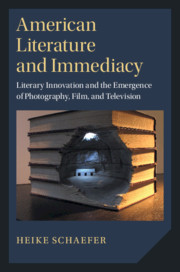 American Literature and Immediacy
American Literature and Immediacy Book contents
- American Literature and Immediacy
- Cambridge Studies in American Literature and Culture
- American Literature and Immediacy
- Copyright page
- Dedication
- Contents
- Acknowledgements
- The Quest for Immediacy in American Literature and Media Culture
- Part I Literary Immediacy and Photography
- Part II Literary Immediacy and the Cinema
- Part III Literary Immediacy and Television
- Chapter 7 Being There: Television’s Aesthetics of Immediacy
- Chapter 8 For Real? The Critique of TV Culture in the Short Fiction of Robert Coover and David Foster Wallace
- Chapter 9 “Nothing Happens Until It Is Consumed”: The Remediation of TV Images in Don DeLillo’s Novel Mao II
- Chapter 10 Fiction in the Age of Television
- Still in Pursuit
- Notes
- Bibliography
- Index
- Series page
Chapter 9 - “Nothing Happens Until It Is Consumed”: The Remediation of TV Images in Don DeLillo’s Novel Mao II
from Part III - Literary Immediacy and Television
Published online by Cambridge University Press: 19 December 2019
- American Literature and Immediacy
- Cambridge Studies in American Literature and Culture
- American Literature and Immediacy
- Copyright page
- Dedication
- Contents
- Acknowledgements
- The Quest for Immediacy in American Literature and Media Culture
- Part I Literary Immediacy and Photography
- Part II Literary Immediacy and the Cinema
- Part III Literary Immediacy and Television
- Chapter 7 Being There: Television’s Aesthetics of Immediacy
- Chapter 8 For Real? The Critique of TV Culture in the Short Fiction of Robert Coover and David Foster Wallace
- Chapter 9 “Nothing Happens Until It Is Consumed”: The Remediation of TV Images in Don DeLillo’s Novel Mao II
- Chapter 10 Fiction in the Age of Television
- Still in Pursuit
- Notes
- Bibliography
- Index
- Series page
Summary
The chapter analyzes how Don DeLillo’s novel Mao II critically refracts TV’s immediacy effects to explore the cultural function that literature performs within the increasingly commodified market dynamics of mass media communication. The chapter argues that DeLillo accomplishes a paradoxical feat: he tells the story of a retrograde writer who loses his life in a futile attempt to resist the commercialization of his work; yet DeLillo suffuses this allegorical tale about the death of an author in the age of mass media and consumer culture with detailed ekphrastic descriptions of TV news footage, photographs, and pop art that ultimately confirm the capacity of literature to respond in innovative ways to the predominance of visual media, the misapprehension of televisual images as real, and the increasing commodification of literature and art. Published as American culture was turning digital, the novel provides an apt terminus for my study of how American writers reworked the immediacy effects of analog new visual media to renew literary culture.
Keywords
- Type
- Chapter
- Information
- American Literature and ImmediacyLiterary Innovation and the Emergence of Photography, Film, and Television, pp. 211 - 233Publisher: Cambridge University PressPrint publication year: 2020


